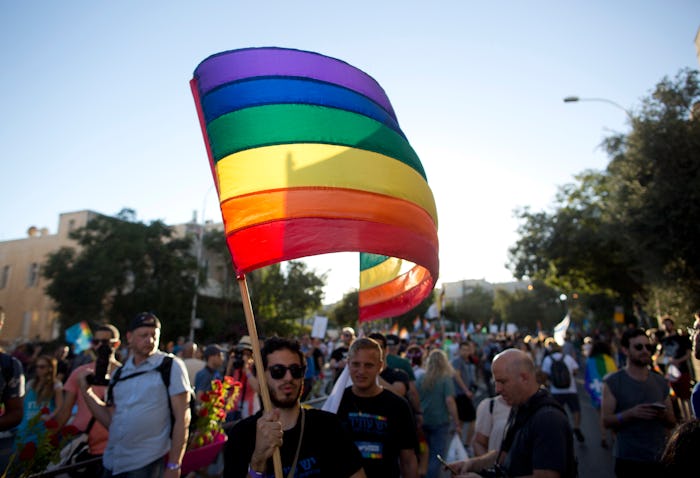News

HB 1523 Hurts The LGBT Community & Families Alike
After being blocked by a Mississippi judge this summer, a Mississippi law that would allow merchants and government employees to deny services to same-sex couples on religious grounds is being heard this week by the 5th U.S. Circuit Court of Appeals. If the court decides in favor of the legislation, how would H.B. 1523 affect families and LGBT couples? Theoretically, the law could disallow LGBT couples from getting married, adopting, or even eating at a restaurant of their choice.
H.B. 1523 was first introduced during Mississippi's 2016 legislative session and subsequently signed into law in April 2016 by Mississippi Republican Gov. Phil Bryant as the euphemistically-named Protecting Freedom of Conscience from Government Discrimination Act (though it was subsequently blocked from going into effect — more on that later). The law purports to protect citizens from religion-based discrimination if (and only if) they believe the following: Marriage is between a man and a woman; Sexual relations are reserved for marriage between a man and a woman; Gender is immutable and corresponds to the biological sex assigned at birth.
Now, a critical thinker might pause, scratch their head, and then ask: How, precisely, have individuals who believe these things been discriminated against? Are folks who believe in the immutability of biological sex being denied service at restaurants, or told they can only drink from a public water fountain if they declare their belief in same-sex marriage? Of course not. Counterintuitively, H.B. 1523 posits that it's discriminatory to not allow people to be discriminatory.
Thankfully, no sooner had the governor's ink dried on H.B. 1523 last year than a number of groups sued the government, as expected. According to an article out today at The Clarion-Ledger, the legislation is part of a nationwide effort to undermine Obergefell v. Hodges, the 2015 Supreme Court decision that effectively guaranteed the right to same-sex marriage. Mississippi's law was written in collaboration with The Alliance Defending Freedom, a Scottsdale, Arizona-based group that has been involved with other, similar bills.
H.B. 1523 was blocked in July by U.S. District Judge Carlton Reeves, who ruled that the law is discriminatory and unconstitutionally prioritizes certain beliefs over others. Today's appeal is being spearheaded by Mississippi's governor and private attorneys, including those working for the Alliance Defending Freedom, according to ABC News.
In a January Slate article by Roberta Kaplan — the attorney who helped block the law in July and is opposing the law again in today's appeal — Kaplan said she is "confident that the 5th Circuit will affirm" the July decision. However, according to multiple sources, if he loses, Mississippi's governor will likely appeal the 5th Circuit's decision in hopes that the case eventually lands with the Supreme Court.
According to Kaplan, the implications of the law, if passed, would be the "contemporary equivalent" of the "no Jews allowed" signs that Kaplan's grandparents faced in the 1930s. H.B. 1523 would permit businesses to refuse "accommodations, facilities, or goods" so long as said services somehow relate to the "solemnization, formation, celebration, or recognition" of a same-sex marriage. The law would allow city clerks to refuse marriage licenses, hotels to refuse lodgings, and even mental health professionals from continuing counseling and treatment for patients who are openly gay.
The law also gives preferred treatment to certain types of religious beliefs over others by allowing only people who believe in the exclusivity of same-sex marriage to deny services to their fellow citizens. (Because c'mon, why can't anyone who is religious be allowed to discriminate?! Yes, this is the rabbit hole this law buries us in.) This was an important aspect of H.B. 1523's downfall last year.
According to ABC News, UCLA law professor Douglas NeJaime testified in June that while over 100 bills have been filed across the country as part of an effort to hack away at Obergefell v. Hodges, H.B. 1523 is the only to specifically list which beliefs would be given preferential treatment under the law. According to Kaplan, one of the most effective testimonies came from Rabbi Simmons, an Orthodox Jewish rabbi who testified that "none of the religious beliefs in H.B. 1523 are held by the vast majority of American Jews."
The temporary fate of H.B. 1523 might be known before the week is over, but this could become a long-fought battle at the nation's highest court.